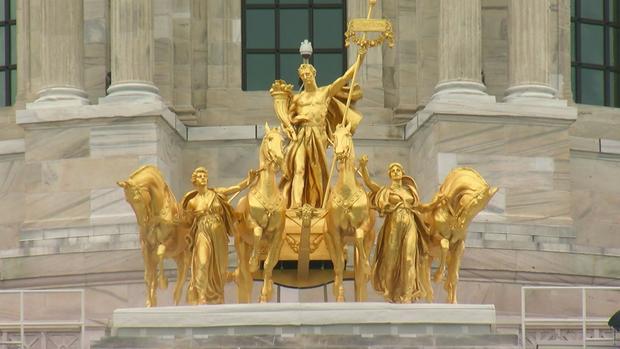Fixes For MNLARS, Tax Filing On Deck For Session
ST. PAUL, Minn. (AP) — Minnesota lawmakers return to the Capitol on Tuesday with plenty of work to do and no guarantee they'll finish it.
The Legislature's work will hinge on an updated estimate of the state's financial status that is due out by the first week of March. It could be slowed by the simmering legal battle surrounding Republican state Sen. Michelle Fischbach, the new lieutenant governor who is fighting to maintain her spot — and the GOP's one-seat majority — in the Senate.
Here's a look at what's on tap at the Capitol for the three-month session:
TAX CONFORMITY
Legislative leaders are unanimous that a top priority is aligning Minnesota's tax code with the recent federal tax overhaul.
The so-called tax conformity is an annual task for the Legislature. But the massive tax breaks that Congress recently passed make this year's job a mammoth undertaking. Failing to align the state's tax code could create a logistical nightmare for Minnesota residents when filing taxes next year.
The Legislature's top tax experts, such as state Sen. Roger Chamberlain, have to balance the quest for simplicity against the risk of hitting some residents with a tax increase. While many U.S. taxpayers may get a tax cut, high-tax states like Minnesota may collect more in taxes. The Minnesota Department of Revenue estimates it would collect an additional $530 million over the next two years just by mirroring the new federal tax laws.
Chamberlain, a Lino Lakes Republican who chairs the Senate Tax Committee, said his focus will be finding ways to relieve those unforeseen tax hikes, including on some small businesses and families with several children. He guessed a conformity bill will start to take shape in mid-March but that the work would continue well into the spring.
"It's hard for people to follow until it hits their wallet," he said.
MNLARS
Fixing the state's new computer system for driver's licenses and plates after its botched rollout will be another top priority for many lawmakers.
The new system, called MNLARS, has frustrated consumers and registrars alike with glitches, lengthy workarounds and long delays. State officials have laid out a plan to get it on track, but it won't come cheap at $43 million.
That price tag has infuriated both Republicans and Democrats, who note that the additional funding would more than triple the system's original estimated cost.
PUBLIC WORKS
Funding for a massive list of public works projects is a mainstay in even-numbered years, and 2018 likely won't be different.
Gov. Mark Dayton wants to go big: He's laid out his proposal for $1.5 billion in borrowing, emphasizing improvements on college campuses and water infrastructure. But Republicans have balked at that large number, insisting it should be half that amount.
The so-called bonding bill generally doesn't come together until the waning days of a legislative session, and it's a product of horse-trading to win the necessary votes from both parties.
OPIOID ABUSE
Dayton is making the fight against opioid abuse a marquee issue for his last year in office.
He and lawmakers from both parties will renew a push to levy a "penny-a-pill" tax on narcotic medications, with the goal of raising $20 million to fund treatment and prevention programs. Similar efforts in previous years fell flat, as the proposed taxes faced stiff resistance, including from major pharmaceutical companies.
State health department data show fatal opioid overdoses have grown by roughly 430 percent in the last two decades, with abuse affecting communities of color and American Indians the hardest.
CONSTITUTIONAL AMENDMENTS
Lawmakers have a short window in which to put constitutional questions to Minnesota voters.
Legislative leaders are still kicking around ideas for what constitutional changes they may put on the ballot, but one likelihood is whether to ensure that sales taxes on auto parts and car rentals permanently go toward funding road and bridge repairs. That was a key piece of last year's transportation funding package, but some lawmakers worry it could easily be reversed if it's not cemented in the constitution.
SEXUAL HARASSMENT
Two male lawmakers were forced to resign late last year, and sexual harassment policies at the Capitol are under the microscope.
House Speaker Kurt Daudt and Senate Majority Leader Paul Gazelka are intent on handling it internally. Daudt said all 134 House members will receive training Wednesday or be tossed off their committees. Gazelka said he's launched a review of the Senate's decades-old sexual harassment policies.
But some lawmakers such as Rep. Erin Maye Quade — a Democrat who accused Sen. Dan Schoen and Rep. Tony Cornish of harassment — are pushing for more, calling for an external task force to study changes and handle complaints.
(© Copyright 2017 The Associated Press. All Rights Reserved. This material may not be published, broadcast, rewritten or redistributed.)




